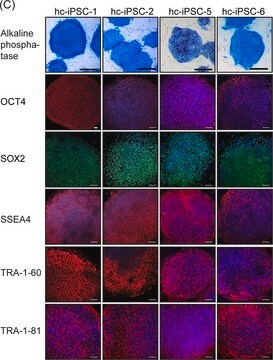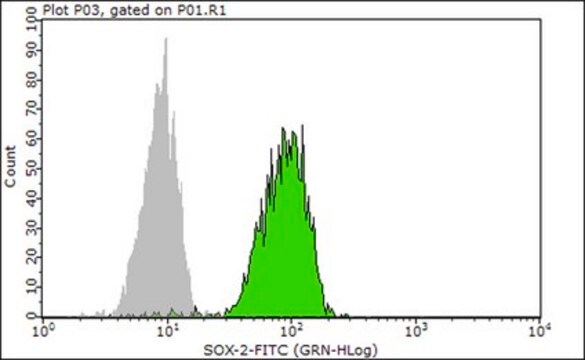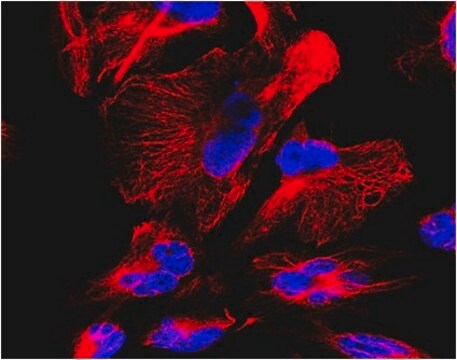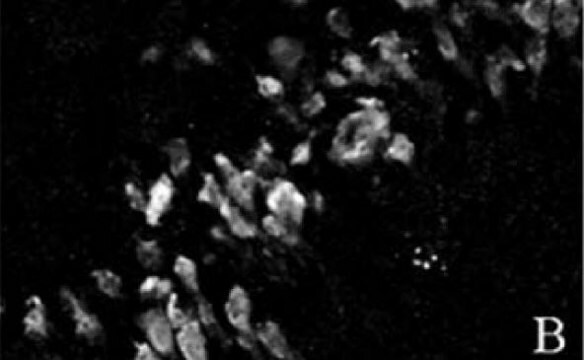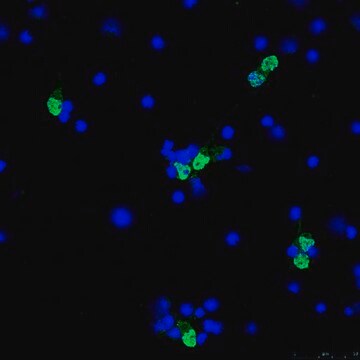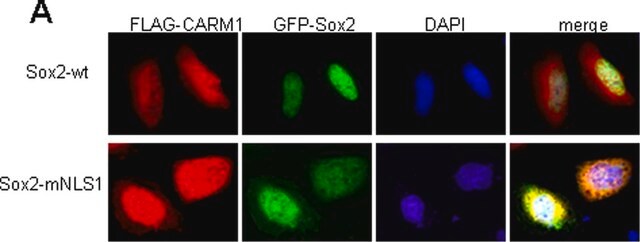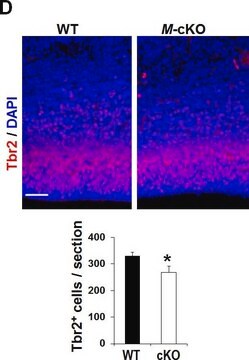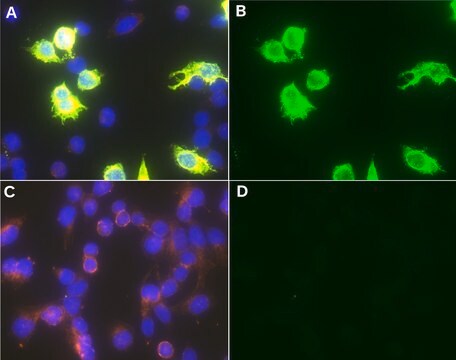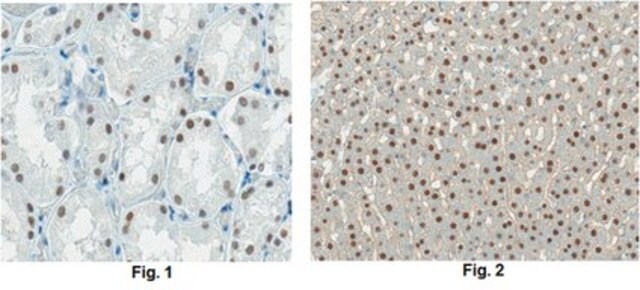推薦產品
生物源
rabbit
品質等級
共軛
ALEXA FLUOR™ 488
抗體表格
affinity isolated antibody
抗體產品種類
primary antibodies
無性繁殖
polyclonal
物種活性
human
物種活性(以同源性預測)
mouse (based on 100% sequence homology), rat (based on 100% sequence homology)
製造商/商標名
Milli-Mark®
技術
flow cytometry: suitable
同型
IgG
NCBI登錄號
UniProt登錄號
運輸包裝
wet ice
目標翻譯後修改
unmodified
基因資訊
human ... NANOG(79923)
一般說明
NANOG is a gene expressed in embryonic stem cells (ESCs) and is thought to be a key factor in maintaining pluripotency. NANOG thought to function in concert with other factors such as POU5F1 and SOX2 to establish ESC identity. These cells offer an important area of study because of their ability to maintain pluripotency, i.e., these cells have the ability to become virtually any cell of any of the three germ layers (endoderm, ectoderm, mesoderm).
NANOG may be useful in the immunohistochemical diagnosis of tumors. NANOG is expressed in germ cells of the fetus and in some germ cell tumors of the gonads and central nervous system (CNS).
NANOG may be useful in the immunohistochemical diagnosis of tumors. NANOG is expressed in germ cells of the fetus and in some germ cell tumors of the gonads and central nervous system (CNS).
特異性
Antibody recognizes NANOG.
免疫原
Epitope: N-terminus
Linear peptide from mouse Nanog.
應用
Milli-Mark Anti-Nanog-Alexa Fluor 488 Antibody, N-terminus is an antibody against Nanog-Alexa Fluor 488 for use in FC.
Research Category
Stem Cell Research
Stem Cell Research
Research Sub Category
Pluripotent & Early Differentiation
Pluripotent & Early Differentiation
品質
Evaluated by flow cytometry using 2102 Ep cells
標靶描述
34 kDa Calculated
外觀
Antigen Affinity Purified
Purified rabbit polyclonal IgG conjugated to Alexa Fluor™ 488 in PBS with 0.1% sodium azide and 15 mg/mL BSA
儲存和穩定性
Maintain refrigerated at 2-8 °C protected from light in undiluted aliquots for up to 6 months from date of receipt.
分析報告
Control
2102 Ep cells
2102 Ep cells
法律資訊
ALEXA FLUOR is a trademark of Life Technologies
MILLI-MARK is a registered trademark of Merck KGaA, Darmstadt, Germany
免責聲明
Unless otherwise stated in our catalog or other company documentation accompanying the product(s), our products are intended for research use only and are not to be used for any other purpose, which includes but is not limited to, unauthorized commercial uses, in vitro diagnostic uses, ex vivo or in vivo therapeutic uses or any type of consumption or application to humans or animals.
未找到適合的產品?
試用我們的產品選擇工具.
儲存類別代碼
12 - Non Combustible Liquids
水污染物質分類(WGK)
WGK 2
閃點(°F)
Not applicable
閃點(°C)
Not applicable
分析證明 (COA)
輸入產品批次/批號來搜索 分析證明 (COA)。在產品’s標籤上找到批次和批號,寫有 ‘Lot’或‘Batch’.。
Rong Li et al.
Stem cell research, 34, 101374-101374 (2019-01-15)
Noonan syndrome with multiple lentigines (NSML), formerly known as LEOPARD Syndrome, is a rare autosomal dominant disorder. Approximately 90% of NSML cases are caused by missense mutations in the PTPN11 gene which encodes the protein tyrosine phosphatase SHP2. A human
Amanda Baskfield et al.
Stem cell research, 37, 101436-101436 (2019-04-23)
Niemann-Pick disease type B (NPB) is a rare autosomal recessive lysosomal storage disease caused by mutations in the SMPD1 gene, which encodes for acid sphingomyelinase. A human induced pluripotent stem cell (iPSC) line was generated from dermal fibroblasts of a
Manisha Pradhan et al.
Stem cell research, 54, 102400-102400 (2021-05-30)
NGLY1 deficiency is a rare disorder caused by mutations in the NGLY1 gene which codes for the highly conserved N-glycanase1 (NGLY1). This enzyme functions in cytosolic deglycosylation of N- linked glycoproteins. An induced pluripotent stem cell (iPSC) line was generated
Wei Huang et al.
Stem cell research, 37, 101427-101427 (2019-04-02)
Mucopolysaccharidosis type III B (MPS IIIB) is a lysosomal storage disorder caused by mutations in the NAGLU gene encoding N-acetylglucosaminidase. Here, we report the generation of a human induced pluripotent stem cell (iPSC) line from dermal fibroblasts of a MPS
Junjie Hong et al.
Stem cell research, 37, 101451-101451 (2019-05-10)
Mucopolysaccharidosis Type II (MPS II), also known as Hunter syndrome, is a rare X-linked genetic disease caused by mutations in the IDS gene encoding iduronate 2-sulfatase (I2S). This is a multisystem disorder with significant variation in symptoms. Here, we document
我們的科學家團隊在所有研究領域都有豐富的經驗,包括生命科學、材料科學、化學合成、色譜、分析等.
聯絡技術服務